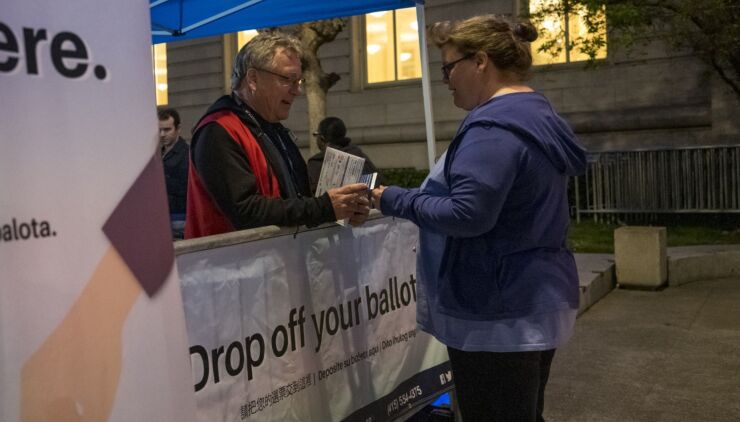California voters received largely favorable reviews from Moody's Investors Service for approving school-related ballot measures and the failure of a statewide measure that would have raised taxes on high earners that analysts say could have driven more business out of the state.
Moody's zeroed in on a handful of items it considered significant out of the hundreds before voters in a state that saw $15 billion in local bond measures on its mid-term ballot. Schools and teachers fared well, though two measures were slightly credit negative for San Francisco, Moody's analysts wrote.

It highlighted the passage of San Francisco Unified School District's Proposition G, which it deemed credit positive for the school district. The school district will receive roughly $800 million to improve academic achievement. The same measure was, however, modestly negative for the city, analysts said, because it will lose income as mandated transfers of general fund money to a separate entity limits the city's financial flexibility.
San Francisco voters' approval of a retroactive increase in pension cost-of-living adjustments was deemed a limited-credit negative, because analysts say it will cause a minor liability increase. That measure will increase the COLAs awarded to a subset of retirees removing a conditional requirement tied to the funded status of the San Francisco Employees' Retirement Systems, a limited credit-negative development for the San Francisco.
The passage of Long Beach Unified School District's $1.7 billion in general obligation bonds was deemed a credit positive. Moody's analysts said that measure would "provide a dedicated funding source to address capital needs and demonstrate continued taxpayer support for education."
Workforce housing bond measures, approved in six school districts statewide — including a $5.3 billion Los Angeles Community College District measure and San Diego Unified's $3.2 billion measure — aimed at providing affordable housing for K-12 and community college teachers, were also deemed a credit positive. The funding would aid the districts' ability to attract and retain essential workers in a state with a high cost of living, most prominently amid a teacher shortage.
While Massachusetts decided to test a millionaire tax, California voters said "no," to taxing residents earning over $2 million.
The Massachusetts measure places a 4% tax on income over $1 million, adding to state revenues, but analysts cautioned it increases revenue forecasting risk, creates heightened revenue volatility and could test the state's ability to attract high-income earners. Californians rejected Proposition 30, a statewide proposal to levy an additional 1.75% tax on income over $2 million, which analysts said avoids increasing the already elevated burden on high earners.
Proposition 30 would have provided funding for programs to reduce air pollution. The measure
Opponents argued that Lyft, a ride-hailing service, which donated $15 million in support, wanted Californians to subsidize its drivers having to purchase electric vehicles to meet a state mandate. The California Air Resources Board
Some business interests, including the California Chamber of Commerce, also opposed it, saying the tax would burden entrepreneurs and investors, driving investment out of the state.
"Proposition 30 proposes a tax hike on higher-income taxpayers by 1.75 percentage points, which would raise the top income tax rate to a whopping 15.05% — far higher than any other state income tax in the nation," Jennifer Barrera, president and CEO of the California Chamber of Commerce, wrote in a position piece on the chamber's website. "To be clear, a 'No' vote on Proposition 30 is a vote against new taxes, not a vote against the environment."
Proposition 30 would have raised taxes by $60 billion to $80 billion over the course of 20 years to support projects and programs that are already top spending priorities for lawmakers, she wrote.





